I love writing about Taiwan’s unusual side. Leave Din Tai Fung, Taipei 101 and Taroko Gorge to the first time in Taiwan Gen-Z travel bloggers. I’ll take the temple complex made from seashells or the coffee shop whose maître d’ is a snow-white alpaca (both spots make a great day-trip from Taipei City – leave a comment below for directions). Weird spots pique my interest as a travel writer. Which is probably why I wound up here. Taiwan has no shortage of unique travel destinations. (Read more: Netflix ‘Street Food’ Season One: All of the Chefs Featured, and Where to Find Them)
A few months back, my good friend Tobie Openshaw forwarded me an email he’d gotten from a German production company called Maximus Film.
“We’re planning a filming trip to Taiwan next month, and we’re hoping to visit a restaurant called “Uncle Sheep” in Chiayi that makes an earth-oven lamb dish. We would love to visit Mr. Chou in his restaurant and see how he prepares the special dish. We would need one shooting day for this story. Do you have time to help?”
I’d acted as a fixer for TV crews in Taiwan before, and was intrigued by the idea of a family restaurant with a unique method of food preparation. As Tobie didn’t have time to make the trip, I offered to help Maximus out. The gig seemed pretty straightforward.
But in Taiwan, things often go from straightforward to unpredictably complicated quickly.
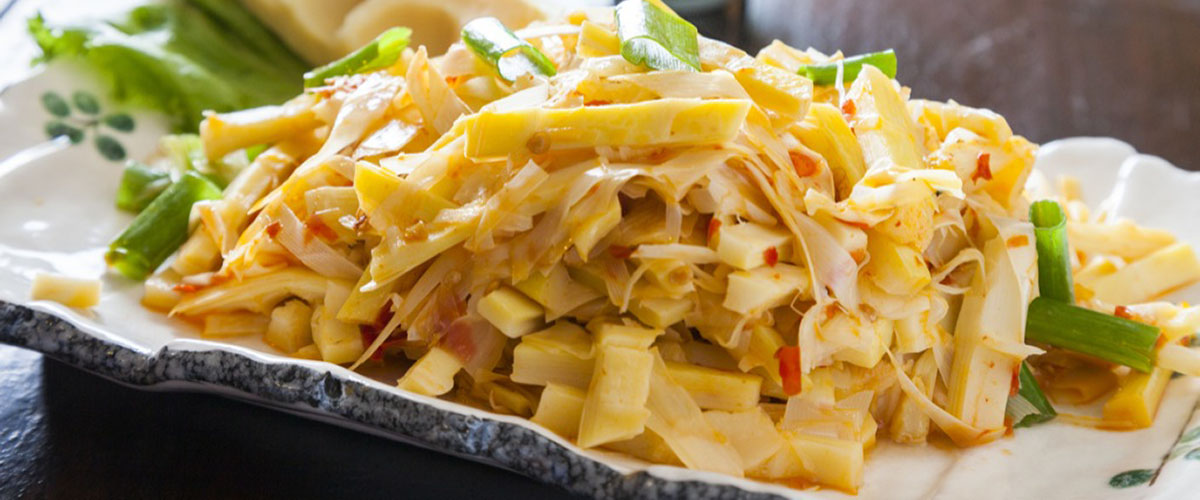
My first inclination of how weird things were going to get came when I called up Mr. Chou, alternately known as “Uncle Sheep” and “Uncle Goats”. He was delighted at the idea that a TV crew from Europe wanted to do a segment on his restaurant. He seemed particularly happy to be receiving visitors from Germany.
“This is great! But I need to ask them to bring me something from home.”
Figuring he wanted strudel, I said I was sure this could be arranged.
“What do you need?”
“Four new fángdú miànjù.”
Having no idea what fángdú miànjù meant, I kept the conversation going, hoping for clarification through context.
“Four fángdú miànjù…” I said. “For cooking?”
“Yes, yes. Fángdú miànjù are a vital part of my cooking process. The ones I have are worn out, and without them, I can’t cook my signature dish.”
Still in the dark, I passed the phone over to one of my colleagues.
“Mmm…uh huh. Yes. Mmmm,” she said to Mr. Chou in Mandarin, then said to me in English:
“Fángdú miànjù are gas masks. Mr. Chou needs four gas masks.”
I took the phone back.
“Gas masks? You mean like what police and soldiers wear?”
“Exactly! I need them for my cooking process! My special dish is made inside of a walk-in oven, and you can’t go inside for even a minute without a gas mask. And the film crew will need to wear gas masks to film my process, so might as well bring four of them. The best come from Germany. Of course, I’ll buy them after the filming.”
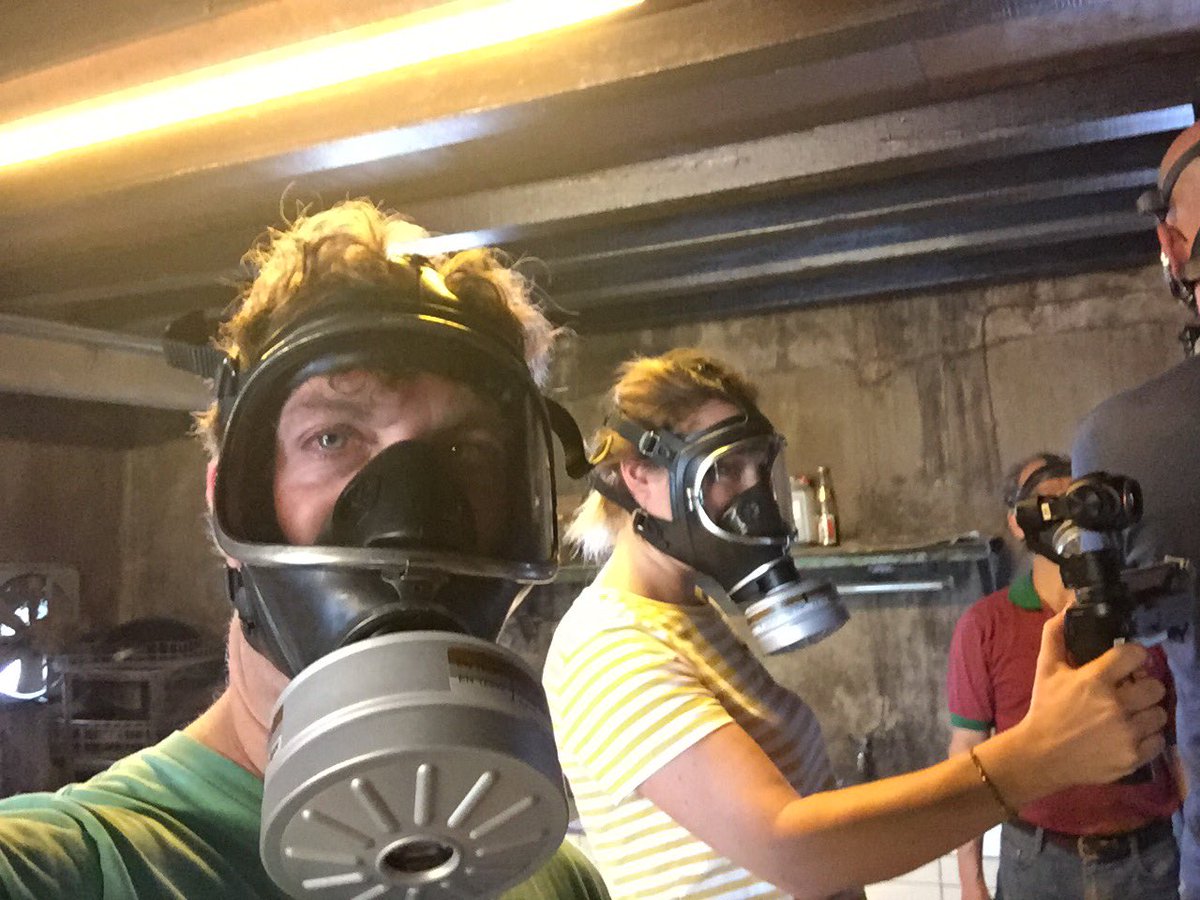
I communicated this unusual request to the film crew, who said they were willing to bring four industrial-grade gas masks if it would secure the arrangement. After a bit of email back and forth, a date was set.
I wasn’t sure how I felt about eating a meal whose preparation required a gas mask, but I was certainly looking forward to writing about it.
Before continuing, readers may be a bit confused regarding the genus (“ovine” or “capra,” for those looking for a bit more book knowledge) of the signature dish, being that the restaurant’s name is “Uncle Sheep”, its website is UncleSheep.com.tw, while Mr. Chou’s Facebook handle is “Uncle Goats Chou“.
The Chinese word for sheep is羊 (pronounced Yáng), while goat is山羊(Shānyáng, literally “mountain sheep”). However, Taiwan isn’t as big on mutton as China (most Taiwanese find it a bit strong, though its consumption is considered medicinal), so in meat-form the two are sometimes confused. In any event, Uncle Sheep’s signature dish is goat hot pot. So back to the story.
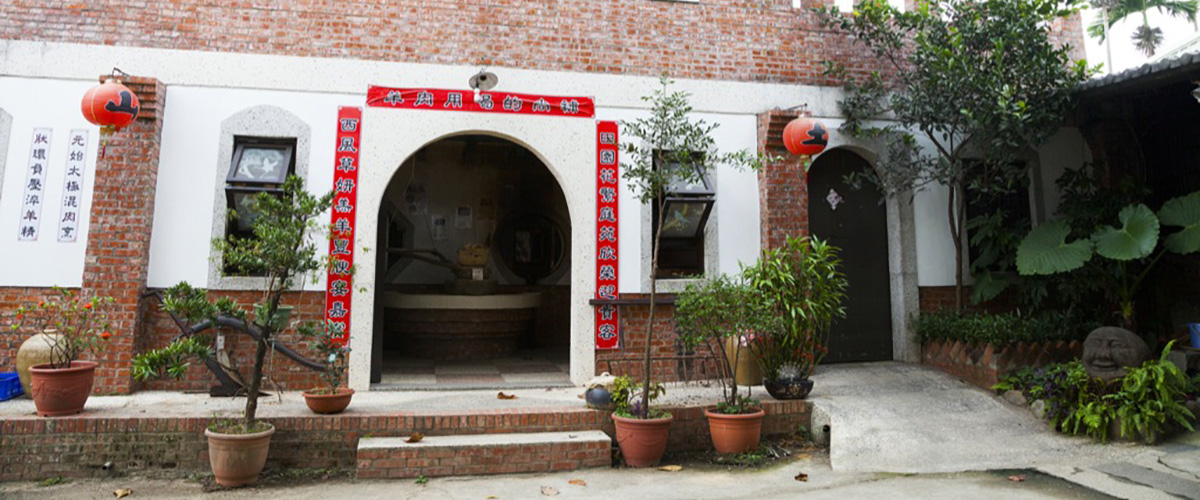
On the appointed day, I met up with the show host and her videographer in Chiayi city, and we were soon off by taxi to see Mr. Chou, AKA Uncle Goats, at Uncle Sheep Restaurant in Chiayi’s Minxiong Township. Located in a rural area about 20 minutes out of Chiayi (a town best known as a gateway to Alishan), the restaurant itself is a series of traditional Taiwanese houses. Pulling in a few hours before the lunchtime rush, we were greeted enthusiastically by Mr. Chou and his wife.
After a brief and culturally-required pause for tea, fresh pineapple, and name-card swapping, we got down to business. For the next three hours the crew filmed Mr. Chou as he engaged in the daily ritual of preparing easily the most labor-intensive dishes this side of the infamous turducken (a chicken inside a duck inside a turkey), whose 12+ hour prep time is a bowl of microwave popcorn compared to Mr. Chou’s 7-day slow-cooked goat hot pot.
The recipe had been passed down from his grandmother, Mr. Chou explained as he placed several pounds of goat meat, a multitude of traditional Chinese medicinal herbs and eleven bottles of rice wine into a massive earthenware pot. But it wasn’t the ingredients that led a TV crew in search of good television across the globe, it was the method itself. After putting the lid on the pot (which now weighed close to twenty pounds) Mr. Chou carried it into the courtyard for the sealing process, wrapping it first with a layer of industrial-grade aluminum foil, then slathering it with a thick coating of mud, nearly doubling its weight.
From there, video camera rolling, Mr. Chou carried the heavy mud-slathered clay pot into the outer layer of what the German TV crew would dub in their show “die Höllenküche” – the kitchen of hell. Past this point, gas masks would be required. As we donned ours, making sure the seals were airtight, Chou explained the absolute necessity of wearing the masks inside of the smoke-filled walk-in oven.
“Even with the mask, I try to keep my time inside to just a few minutes per day,” he said. “Even that is bad for my health.”
Fully masked, we were ready to enter the hell kitchen, the heart of Chou’s operation. Though my job was to translate between crew and chef, within seconds of walking into the oven (where the air registers at 150 degrees Fahrenheit, appropriately close to 66.6 degrees Celcius) it was clear that communication was hardly possible.
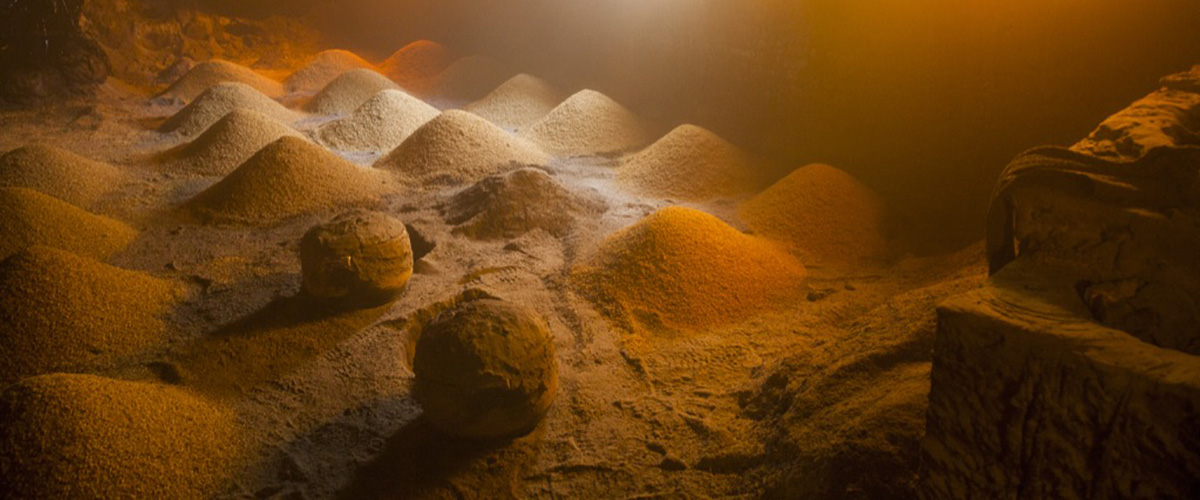
Movement itself was difficult. As the cameraman filmed from the doorway, the host and I stood to one side and watched Mr. Chou performs his daily ritual of burying the sealed earthenware pot in a hole in the oven’s dirt floor, covering it with rice husks and setting the pile on fire. He then quickly checked on the other pots, shoveling burning embers here and there before donning a thick pair of gloves to remove one of the pots furthest from the door. Moments later, we were extremely grateful to be able to follow Mr. Chou out of the walk-in oven.
With great delicacy, he placed the dried mud-encrusted pot, visibly lighter than the one he’d brought in, on the stone table.
“This one is our lunch today,” he said, hanging his gas mask back on the wall hook as we did the same. “This pot has been cooking for seven days inside my oven, where temperatures can exceed 1000 degrees Celsius!”
As the cameraman repositioned the camera, Mr. Chou brought the superheated pot into the courtyard, where he broke off the baked mud and peeled back the blackened foil before opening the pot itself.
Despite the heavy seal, the liquid had reduced to about 70%.
We followed Mr. Chou and the pot into the kitchen, where he scooped the stew into six smaller serving pots. At this point, his dining room was full, his customers having started on appetizers. The main course could now be served.
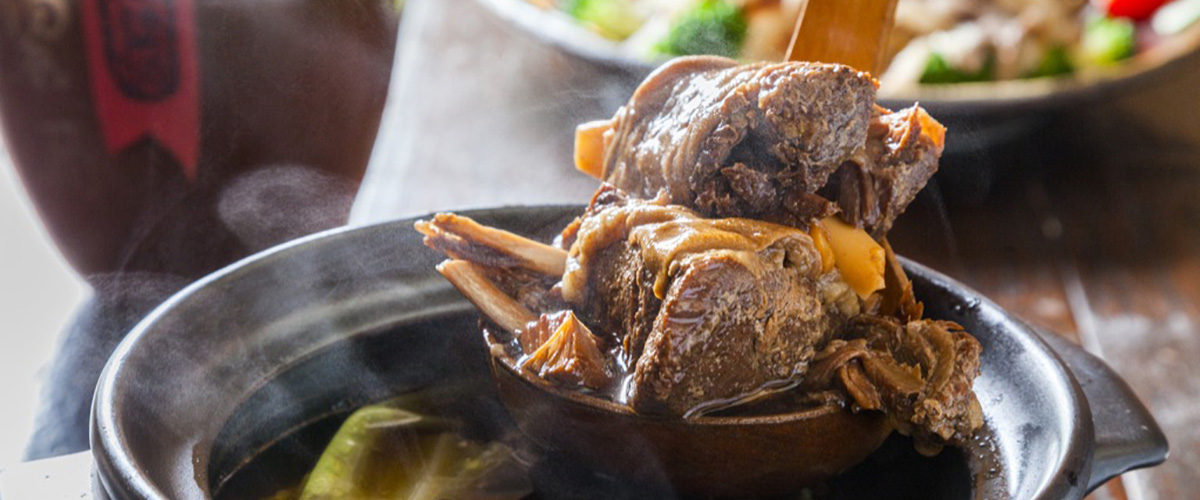
So what does goat stew that’s been cooked for seven days taste like? Savory, delicious, and distinctly healthy, with the broth heavy with herbs and rice wine. The meat, heavy with flavor, was nearly butter-soft. Mr. Chou described it as “the best goat hot pot in the world,” and on that point he’ll get no argument from me, or from the German TV Crew, who seemed to enjoy thoroughly a dish they’d traveled across the globe to taste.
Below is the TV segment that was shown on TV in Germany (in German) about Uncle Sheep Restaurant. For viewers who don’t speak German, don’t fret. Most of the dialogue from the segment has been largely covered in this article, and it’s worth watching both to get a glimpse inside of Mr. Chou’s kitchen and to see the look on the host’s face as she finally gets to taste his signature dish. (Keen-eyed viewers may spot your humble narrator inside of the oven – I’m the guy with the purple pants and gas mask!)
[youtube https://www.youtube.com/watch?v=W3krz8iqRK4]While Uncle Sheep’s Goat Hot Pot is its signature dish, Mr. Chou is hardly a one-trick pony in the kitchen. Among the other excellent dishes we ate that afternoon were delicately stir-fried bamboo shoots, pineapple stuffed with rice, two types of chicken dishes, several amazing vegetable dishes and, for dessert, fresh pineapple grown on the farm surrounding Uncle Sheep Restaurant.
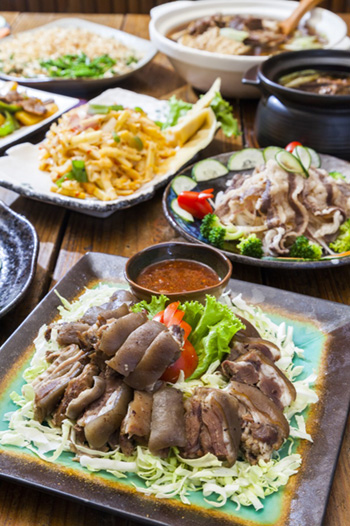
If the film and story have piqued your interest, Uncle Sheep’s Restaurant is open for lunch and dinner four days a week (Friday, Saturday, Sunday and Monday). Click here for details. As you might expect from a restaurant whose signature dish has a 7-day prep time, advanced reservations are suggested.
Interested in making a meal at Uncle Sheep Restaurant part of your customized Taiwan tour? Drop us a line and we’ll make it happen!

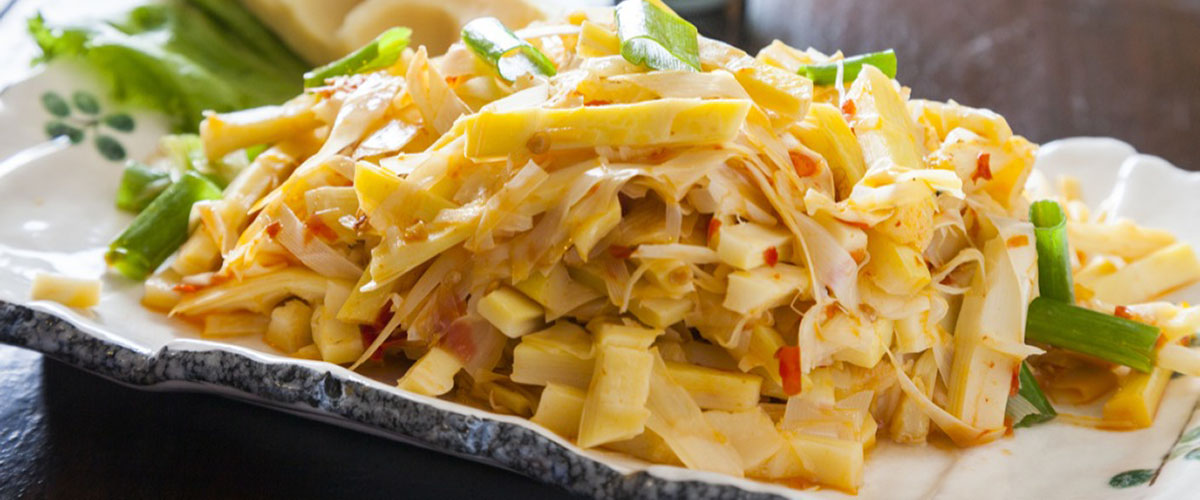
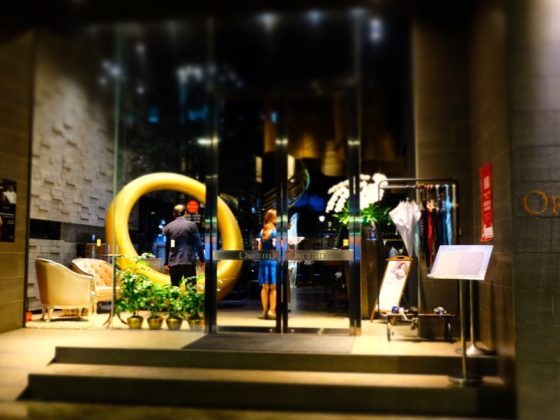
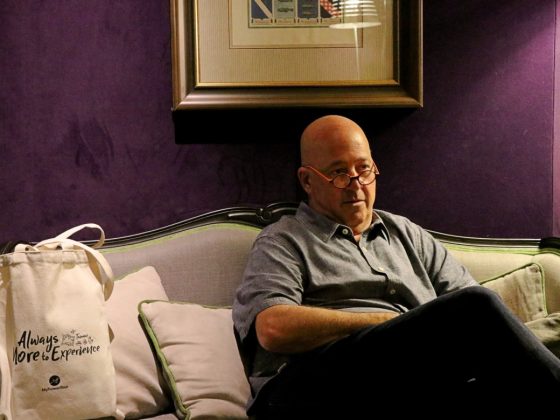









Comments are closed.